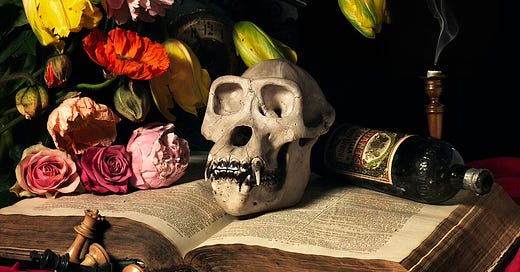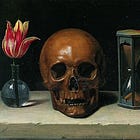A Simple Way To Come Up With Compelling Ideas
The Process #1 How do you go from blank page to published story? Here's my how-to guide
Hi there, this is the start of a deep dive into how I write, going from a blank page to a published story.
I’m using a short thriller, provisionally called Meat, which will be published by Comma Press in an anthology called Monster Capital (working title!) but the process is pretty much the same for a full length novel - obviously, much quicker or we’d all be here for months!
I hope by following the same journey as I have, you might pick up some thriller writing tips and suggestions for how to write fiction in general, or if you have no interest in being a writer, but enjoy reading, you might find it interesting to see what goes into creating a story.
It’s an unusual position to be in: I’ve been commissioned to write a short piece of fiction to a brief. The last time I was told what to write was in school. I’ve had to submit ideas to my publishers in order to extend my book deal from two to four books, and then they chose the ideas they liked best - and, as I’ll talk about later when I write about genre, they had to be psychological thrillers and firmly in the domestic noir arena. I’m thrilled about this commission and, to be honest, a little anxious.
The commission came from Ra Page, CEO of Comma Press. He loved the story I wrote for him, The Divide, in The Book of Bristol, and wanted to put together a collection called Monster Capital. He sent me a long email, a mini treatise on capitalism and horror, which was absolutely fascinating.
“As well as literary realism, Comma regularly dabble in psychological horror, and what we like to call 'theory horror' - stories of modern unease written (partly) in response to modern theories about horror.” Ra Page
And then wrote - but don’t put any of that in. Your job is to tell a good story without philosophy or politics. The theme of the story will speak to capitalism. Followed by a list of topics. I had to choose one - and let him know which one I’d picked. (I will put a few at the bottom of this article so you use them as prompts if you’d like to).
“Whilst critiquing capitalism, Marx and Engels were also in awe of it and its productive powers; regarding it as a power unleashed and uncontrollable. They portrayed capitalists (the unleashers) as like 'the sorcerer, who is no longer able to control the powers of the nether world whom he has called up by his spells’ (Communist Manifesto, Penguin, 1967, p226) - a clear, if modified, allusion to Goethe's 'The Sorcerer's Apprentice'.” Ra Page
I was so thrown and somewhat terrified by this, that I printed out his email and carried it around with me. Occasionally I’d unfold it and look at it, but not really read it, and then put it away again. Part of the problem, I guess, was that I’m currently writing psychological thrillers under my pseudonym of Sanjida Kay, and I didn’t want to veer off and write horror.
I firmly believe a writer should be able to write anything they want, but I have a Sanjida Kay readership, I love writing thrillers and I’m not a fan of horror fiction. Then I realised that the thriller genre intersects with horror (and also that Ra’s ideas about horror were far more nuanced than I’d realised and leant towards the psychological). More on this is another post, but crime is horrific, and most crime fiction has elements of suspense and shock, just as horror fiction does.
So how to begin? It’s the perennial question authors are asked: where do you get your ideas from? I’m going to outline exactly how I’ve gone from zero words to a story that will, hopefully, be published later this year. And I hope that this process will help you too. Some of my process and suggestions may resonate, others may not. Let me know if any of the following suggestions work for you.
Normally, I have some ideas knocking about that I keep in a folder. They’re generally a combination of an event, a location and a feeling and then I ask - What if…? Nothing in my folder seemed suitable, but in my late teens and early twenties I wrote a lot of sci-fi short stories, and I vaguely remembered one of them and thought it could be appropriate because it was about art and ethics and could fit into the capitalist theme of commodification (in this instance, of art, food and relationships).
In my extremely old short story (no idea where it is!) a young man creates an art show using lab-grown meat. He lives on a canal boat (the place), which is dank and dark, and the reveal is that at the exhibition (the event), we, the reader, discover that the meat is somehow sentient and feels pain. I imagined a bench running down the inside of the canal boat, and giant Petri dishes with spotlights playing on them, each one with a huge slab of meat, like a thick steak, writhing and twisting.
So the feeling is visceral and horrific when we understand that what the young man has knowingly created as ‘art’, is alive and in unending pain and there is no respite from this torture.
What is interesting to me is that I wrote this over thirty years ago and now we are all on the brink of being able to eat lab-grown meat if we wish to. It is currently sold in Singapore; chicken has just been given approval to be sold in the states and burgers aren’t far behind; so my story, once science-fiction, is now our almost present day.
How to write a thriller?
But how could I turn this idea into a short thriller? It needed - as every story does - a beginning, a middle and an end. A hero. A villain. A twist. A reveal.
I decided to brainstorm the idea with my writing group (more on the creation of this writing group another time as they are a particularly special bunch!) but I felt I had to outline my idea properly for them. I couldn’t turn up saying, There’s this guy on a canal boat and he’s got an art show with some pieces of meat that are like, you know, living and like, in pain.
I was so uncertain of my fledgling idea that I put it into ChatGPT. (You might be interested in my post on whether AI will steal our jobs: Writers, we’re not in Kansas anymore). I asked the generative AI to write a synopsis for a short psychological thriller about a person who creates art from lab-grown meat, which feels pain. This is the start of what came back a few seconds later:
Title: "The Carnal Canvas"
In the not-so-distant future, where lab-grown meat had become the norm for sustenance, a brilliant yet reclusive artist named Evelyn Marlowe had devised a peculiar and controversial concept: she would create art from lab-grown meat. Her studio, tucked away in an obscure corner of the city, remained a mystery to most.
Evelyn's fascination with the macabre and the grotesque was notorious, and her artistry had always been unconventional. However, her latest project pushed boundaries further than anyone could have imagined. She called it "The Carnal Canvas." It was rumored that she used a unique blend of cultured animal cells, manipulated to produce meat with vibrant colors and textures.
The story was kind of schlocky and klutzy and clichéd, like a pseudo-Hollywood blockbuster blurb; it lacked nuance and there were a few plot holes. But, weirdly, it gave me confidence in my idea. If AI thought the germ of the idea was good enough to do that with it…surely I could do better?
How to brainstorm fiction
So first I brainstormed the idea using a mind map (as I described in my post on Ten Ways to get Started on Getting Started), and then I wrote ‘an elevator pitch’ for my writing group as if I were heading into a meeting with a publisher.
(An elevator pitch is a one to three line summary of your idea; there’s a great blog on how to write a book pitch over at The Novelry.)
This is what I sent out to my writing group:
A biotech entrepreneur, who is also an artist, has developed artificial meat, but the meat tastes bland, so he adds stem cells from animals to create pain receptors in the meat.
This gives him the idea for how to improve the art installation he’s been creating, which is of strange creatures in tanks; they’re also cultured in a lab, like the artificial meat.
To make his installation more appealing, he adds human stem cells to create pain receptors and mirror neurones, so effectively, his creatures feel pain and seem to mimic emotions; he does this by stealing the stem cells from his girlfriend’s dying mother.1
Brainstorming at such an early stage with other people! is not something novelists tend to do. They are usually more protective of their ideas, seeing them as fragile flowers that need to be cultivated and protected before being robust enough to withstand the onslaught of criticism. Certainly, I used to be like that too.
Thankfully the group were enthusiastic and made me feel confident. One person couldn’t make the meeting so sent me some extremely useful questions to consider.
The group felt the art exhibition was over-complicating the story - but I eloquently argued that the art is the whole point, god damn it!: the exhibition spotlights the philosophical arguments about animal suffering and what sentience is - and it’s being done for money and ego, and is not driven by necessity. The very frivolity of it makes it worse. Not that art is frivolous, but it does take second place to being able to feed oneself.
So here’s the thing about feedback - it’s not always right. But what people are almost always right about, is that there is something wrong with that bit and you need to fix it.
We concluded that the biotech guy couldn’t also be the artist in the story (too complicated). Later I realised that I’d further complicated the story by having a second ‘revenge’ exhibition, which I didn’t need.
We talked about the characters, what their feelings were, the relationship between mothers and daughters, the ethics of eating meat, the structure and several times, where the jeopardy lay. It was brilliant.
Let me know what you think - how do you go from zero words to a fully-fledged story?
Writing exercise
Below are some of the writing prompts from Ra Page is you want to use them as a springboard for your own work:
- try and beat it and you join it.
fighting capitalism turns you into its champion
if you're born in the gutter, the most immediate way to resist that fate and what capitalism has done to you (or wants to do to you) is to make lots of money, that is to become a capitalist success story
- identity metrics
while the protection of wealth by the wealthy grates at our sense of injustice/inequality, makes us sore because it marginalises those of us who don't have it, capitalism has learnt to alleviate this 'sore', by making us only process inequality according to discrete metrics - e.g. identity metrics - it then slowly makes sure every variant of this metric is represented in images of wealth and power (from government positions of power, through to advertising). But poverty in and of itself is never a metric. We aren't allowed to process the idea that we're poor because we're poor. It has to be poor because of some (identity) metric which they're working on to improve... (Another rendering of this is the American Dream: you aren't wealthy, but in principle, according to all the metrics we allow you to consider, you (or someone with some with your metrics) could one day be wealthy.) Ironically, our identity metric is also profoundly monetisable: identity merges with brand(s), and we then invest in them as consumers.
- the gamification of social relations
as an all-quantifying business ontology creeps across all our thinking, along the way it bumps into and blends with another creeping phenomenon, namely gaming. Sport has always been a stand-in, a kind of fantasy surrogate for real power battles, real claims at status (which, in the real world is largely only bought with money), so it allows us to play a kind of pretend, surrogate version of capitalism. Computer games actually bring that fantasy closer to the thing it's trying to imitate (and with far less physical effort!), through a pretend/surrogate version for capitalism's sharpest tool, war.
War is now something we can all engage in, and at no risk to ourselves, and in the process of eating 'cherries', finding 'power-packs' (or whatever else you do on these games), we have learned to process the value of success (of any kinds) into one, unified system: quantification. Your score.
Marx talked of Commodification - the reduction of everything else (knowledge, people, friendship) into a commodity that's only understood in terms of its monetary value. Social media hood winks us into playing pretend war games with our likes/friends score, whilst actually commodifying all of us into advertising value. Social media is basically virtual capitalism.
Personal self-worth is now a product of such a gamification process, and the 'version of you' that the digital monsters (Google, Amazon, etc) now have in their data/files, is growing closer and closer to your own version of yourself.
- the cancellation of the future
as culture stops creating new paradigms (looking forward to, and predicting 'the next big thing') and just starts canibalising and rehashing its own past 'modes'... or as science fiction stops talking about the next big thing and looks instead at catastrophes already set in motion (the trigger fopr which was rather the last big thing)... there is increasingly a sense of there being no future (the way there used to be a future (i.e. difference ahead of us), as well as no futurism). our current version of capitalism fills the horizon of what is possible. we can no longer even imagine anything other than capitalism.
what does that mean for culture and the past? the value of tradition/the past is often folded into its reaction against the new/the modern/the future; it's challenged by the new and it's valued because it's not the new. if there stops being anything new, doesn't the value of the past/tradition/customs, etc suddenly collapse?
also 'this lack of a future', or 'lack of an outside' (now everything is instantly available to us) doesn't just apply to culture; we can't imagine economic alternatives either, so when the banks fail, we have to bail them out, not just because we can't imagine an alternative, but because we're afraid of it - we punish 'libraries in Wolverhampton' (to quote the famous Alexei Sayle joke), i.e. traces of alternatives (socialism/the welfare state) within our current state to achieve a purer neoliberal free market (i.e. a purer version of what went wrong in the first place). instead of reaching for an alternative, when things break down, we destroy any traces of an alternative within a failed system.
Let me know which one you chose and what you did with it! Sanjida x
Here are next two instalments in this mini series:
If you missed, it, you might be interested in:
When I first created a mind map for this idea, the male protagonist was abusing his step-daughter and had taken her stem cells. I forced myself to redo the mind map until I came up with another idea. I think using the original idea would have been harrowing to write and to read (not a reason not to do it, but worth considering if it’s worth it). More importantly, I think such an emotive story line would have overwhelmed the themes of such a short story, and indeed, the story itself. Choosing an older person as the victim is interesting, I think, because we pay so little attention to the elderly, in fiction as in life, and many older people suffer from abuse, which is rarely seen or spoken about, let alone dealt with. Plus, I have realised that I don’t have to inflict the darkness of my own soul on everyone all the time. :-)








